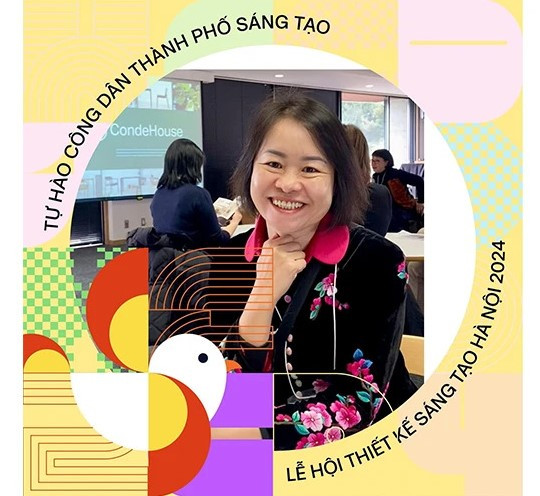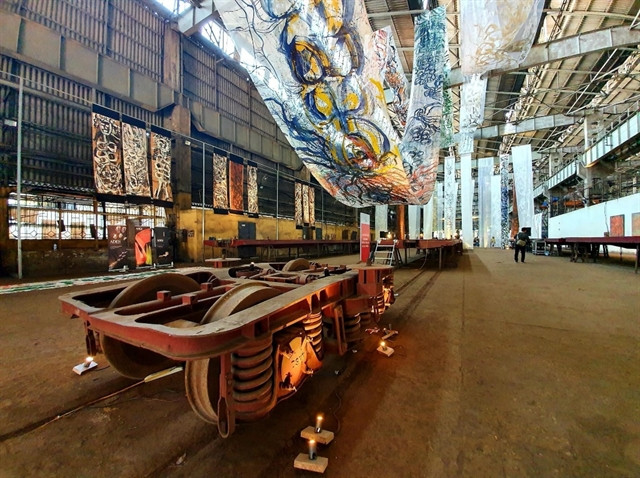 |
| Pham Thi Lan Anh, head of Heritage Management Division, Hà Nội Department of Culture and Sports. Photo nhandan.vn |
The Hà Nội Creative Design Festival 2024 has ended. Held in 2021 for the first time, the festival became an annual event organised by the Hà Nội Department of Culture and Sports and Architecture Magazine. Around 300,000 visitors participated in the nine-day festival this year.
The design festival became one of Hà Nội's commitments after joining UNESCO's Creative Cities Network in 2019.
Phạm Lan Anh, head of the Heritage Management Division of the city's culture department, discusses the role of the Creative City Network in the capital's socio-economic development.
Hà Nội has been a part of the UNESCO Creative Cities Network for five years. However, it seems that not many people really understand what a Creative City is. What do you think?
That's true, because even people working in the cultural and creative fields feel confused at first. The UNESCO Creative Cities Network was established to promote cultural resources and cultural creativity in sustainable development based on seven creative fields: crafts and folk art, design, film, gastronomy, literature, media arts, and music.
Hà Nội has chosen the field of design because it is related to many other aspects of life. Each of us may be participating in the creative process, but not everyone is fully aware of that process or understands the value that creativity brings about.
Although many people still don't really understand it, each year the number of people coming to the Creative Design Festival increases.
Last year, the main festival activities took place in the old Gia Lâm Railway Factory. The event drew in about 200,000 visitors, showing that community awareness is increasing.
The festival's activities were not just displays and performances, but also promote interaction. Visitors had their own experiences of artworks by artisans, artists, and creators in many fields. This could 'activate' their creative potential.
What do you think about the festival this year?
First of all, it took place at an ideal location, along Lý Thái Tổ, Lê Thánh Tông and Bác Cổ-Tràng Tiền streets. This area has many famous buildings of colonial architecture. Even long-time Hanoians still pass by here every day, but they don't know a lot about it.
The festival this year, with the theme Giao Lộ Sáng Tạo (Creative Intersection), enabled people to discover the city's architectural heritage, like the Hà Nội National University. Many people think that the university building is designed in the French architectural style, but it is not. It is the first building in Hà Nội to have a combination of western and eastern architecture.
Architectural heritage was not just in the background, but played a major role in the festival's cultural and art activities.
At this year's festival, almost anyone could find a field that they were interested in. Participating artists honoured the beauty of the city's architectural heritage and expressed their creative selves.
Never before have the art and craft activities been as vibrant as they were in this festival. There were two fairs with about 80 businesses participating, along with about 500 artisans, artists and creators.
 |
| An installation at Gia Lâm Railway Factory at the Hà Nội Creative Design Festival 2023. Photo nhipsongkinhte.toquoc.vn |
What does the Creative City bring to its residents?
Creativity is related to all aspects of life. A Creative City needs to have creative citizens. With a city rich in cultural resources like Hà Nội, as community awareness of the role of creativity in life increases, the ability to exploit those resources in building and developing the city also grows.
Building a Creative City requires the participation of many different levels and sectors. The festival is an activity with a large scope. That's why I want to talk about pervasiveness.
Through the efforts of artists, artisans and creators, the public could find sympathy and inspiration that would activate their creative potential. People who nurture ideas but don't know where to start have an opportunity to cooperate and develop their ideas. From there, they are likely to join the creative economic chain and cultural industry chain in the future.
In developed countries, this creative sector contributes to economic development, even more so than other sectors like industry or finance. Building a Creative City brings opportunities for young people. The story of the Creative City is the story of socio-economic development using cultural resources.
Is it difficult for Hà Nội authorities to awaken creative potential and build a creative environment for the community?
This is a difficult task. Since joining the Creative Cities Network, Hà Nội authorities have considered it to be a necessary task for all levels, sectors and localities.
Hà Nội has the advantage of rich cultural resources. However, we have just gained access to new concepts and methods, which is a big disadvantage. We must learn from the experiences of those who have gone before us.
To have creative citizens, many Creative Cities around the world focus on creative education from a very early age.
Recently I attended a conference in Asahikawa, Japan's Creative City in the field of design. They focus on high school students who are starting their career orientations, but have not yet decided to pursue a career. They have diverse activities focusing on grouping children with similar interests, so that the children can learn, research and develop under the direction of adults.
I was extremely surprised when a group of children presented products from cotton plants. They outlined in detail how to harvest and make the cotton products, as well as innovations in manufacturing and the environmental significance of using natural materials.
I wonder if ten years from now, will they still follow the same path? Will they become experts?
If we work together and focus on our goals, the creative community will certainly become stronger. VNS